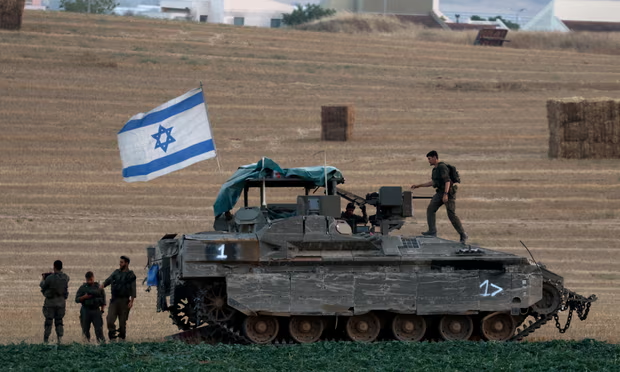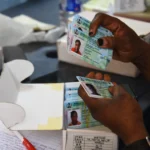
The parents of more than 900 Israeli soldiers deployed in Gaza have signed a letter urging the military to call off its ongoing offensive in Rafah, calling it a “deadly trap” for their children.
“It is evident to anyone with common sense that after months of warnings and announcements regarding an incursion into Rafah, there are forces on the other side actively preparing to strike our troops,” says the letter, sent on 2 May.
“Our sons are physically and mentally exhausted,” adds the letter, addressed to the defence minister, Yoav Gallant, and the Israel Defense Forces (IDF) chief of staff, Lt Gen Herzi Halevi. “And now, you intend to send them into this perilous situation? … This appears to be nothing short of recklessness.”
The letter was initially signed by the parents of about 600 soldiers but in recent days the parents of another 300 have signed it.
Between 360,000 and 500,000 Palestinians have fled Rafah in the past week after Israeli warnings to evacuate eastern and central neighbourhoods before new assaults that look set to open a bloody new phase of the eight-month conflict. The Israeli prime minister, Benjamin Netanyahu, has suggested he will reject US pressure to hold off aon a full-scale attack on the city, where about 1 million Palestinians sought shelter after fleeing fighting earlier in the conflict.
Any fighting in Rafah is likely to be complex and difficult. Hamas have had months to reinforce defences there and tunnel complexes under the city are thought to be largely intact.
“Rafah is a death trap,” said Anat, the mother of an Israeli special forces soldier deployed in Gaza. “Hamas had a lot of time to prepare the place for the killing of our soldiers. We are very concerned and worried.”
Israel has portrayed the city as Hamas’s last stronghold, saying it must invade in order to succeed in its goals of dismantling the group, killing its leadership and returning the 132 hostages that remain missing. Elsewhere in the war-ravaged territory Hamas has been able to reimpose its authority after IDF operations.
“Our apprehensions have materialised as we witness the military withdrawing promptly from an area, only for Hamas to swiftly regain control over it,” Anat said. “In the first months of the war we backed the whole operation. There was no other choice but to fight and get rid of Hamas in Gaza. But in the last months, we understand there is no clear plan.”
Idit, the mother of an Israeli commander, said: “My son sent me a message on WhatsApp a few minutes ago. They are on the move to Rafah, he told me. And I’m terrified. We are not against the mission to fight Hamas, but entering Rafah does not justify this mission.”
Idit said her son did not want to enter Rafah, “but he will, because he is loyal to the army”.
More than 34,500 Palestinians have died during the Israeli offensive, which has caused massive destruction of housing, hospitals, mosques and schools. The war began in October when Hamas attacked southern Israel, killing about 1,200 people, about a quarter of them soldiers. More than 270 Israeli soldiers have been killed in the offensive in Gaza, bringing the total military losses to at least 600, including those who died in October .
The Israeli authorities have not responded to the letter from the soldiers’ parents. However, speaking at a Memorial Day ceremony at the Western Wall in Jerusalem on Sunday, Halevi said he was responsible for providing answers to the families of troops who had been killed.
“I am the commander who sent your sons and daughters to the battle from which they did not return, and to the posts from which they were kidnapped,” Halevi said. “I carry with me every day the memory of the fallen, and I am responsible for answering the sharp questions that keep you awake.”
Support for the aims of the war in Israel remains strong, but there is growing anger at senior policymakers as the conflict goes on. There were widespread protests over the weekend, with thousands taking to the streets to call for the resignation of Netanyahu and immediate elections for a new government.
Other demonstrations called for Netanyahu to do more to secure the return of the hostages still held by Hamas. About 250 Israelis and other nationals were taken to Gaza on 7 October, and 80 released in return for 240 Palestinian prisoners in Israeli jails during a short-lived truce in November.
Relatives of hostages walked out of a speech by Netanyahu during a ceremony in Jerusalem to mark Israel’s Memorial Day, which commemorates Israel’s war dead and civilian victims of terrorism, on Monday.
In the southern city of Ofakim, at a similar ceremony, the mother of a hostage confronted a far-right minister who has fiercely opposed concessions to Hamas in return for a ceasefire deal. In Tel Aviv, protest signs were waved with the slogan “Their blood is on your hands” before a speech by Yoav Gallant, the defence minister.



